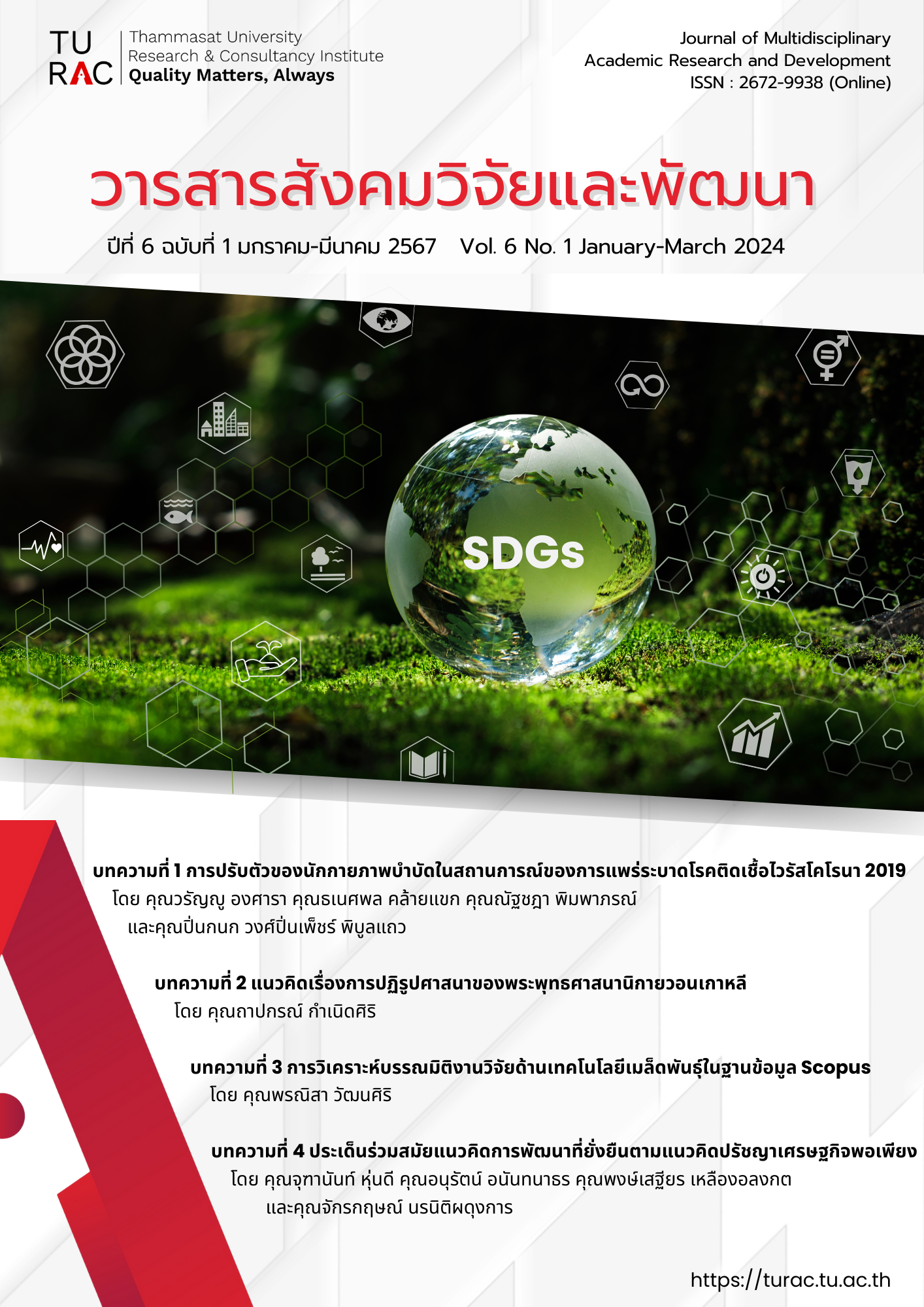Work Adjustments of Physiotherapists in the Situation of the Coronavirus Disease 2019 (COVID-19) Pandemic
Keywords:
Work adjustment, Physiotherapists, Coronavirus disease 2019, PandemicAbstract
The objectives of this research were: 1) to study the meaning of work adjustment for physiotherapists; 2) to study the process of work adjustment for physiotherapists; 3) to study factors related to work adjustment for physiotherapists; 4) to study the results of work adjustment for physiotherapists. Group of key informants of 20 physiotherapists working in Bangkok province. Random sampling using a non-probability method. Qualitative research. The research instrument was a semi-structured interview. Data were collected through interviews and analyzed by content analysis.
The results showed that 1) Work adjustment means changing some working patterns to be more suitable for the environment. 2) The process of work adjustment can be divided into three phases: before work, working, and after work.
3) Supporting factors: (organizational) organizations has promoted factors that help support physiotherapists to adapt during the pandemic. (personal) physiotherapists must adapt to the situations. Obstacle factors (organizational) physiotherapists face organizational and psychological obstacles. (personal) physiotherapists faced the risk of infection from work. 4) Positive outcome: (organizational) COVID-19 surveillance measures at the hospital stimulated staff to work to maintain the high standards of clinic services. (personal) Stress decreased, felt more comfortable coming to work. Negative effects (organizational): Uncertain income for both hospitals. (personal) Concerned, afraid of infection among individual.
References
กรมการแพทย์. (2565). แนวทางปฏิบัติการปรับรูปแบบบริการฟื้นฟูในสถานการณ์การระบาดของ covid-19. สืบค้นจาก https://covid19.dms.go.th/Content/Select_Landding_page?contentId=50.
กระทรวงสาธารณสุข. (2565). แนวทางเวชปฏิบัติ การวินิจฉัย ดูแลรักษา และป้องกันการติดเชื้อในโรงพยาบาล กรณีโรคติดเชื้อไวรัสโคโรนา 2019 (COVID-19) สำหรับแพทย์และบุคลากรสาธารณสุข. สืบค้นจาก https://covid19.dms.go.th/Content/Select_Landding_page?contentId=181.
ชาย โพธิสิตา. (2562). ศาสตร์และศิลป์ การวิจัยเชิงคุณภาพ. พิมพ์ครั้งที่ 8. กรุงเทพฯ: อมรินทร์พริ้นติ้งแอนด์.
สภากายภาพบำบัด. (2562). ข้อบังคับสภากายภาพบำบัด. สืบค้นจาก http://164.115.42.51/PTCouncil/rule.php
สุกัญญตา เฉียบแหลม. (2553). ความสัมพันธ์ระหว่างความเครียดและการปรับตัวในการทำงานของพนักงานธนาคารกสิกรไทย จำกัด (มหาชน) สำนักงานใหญ่. (สารนิพนธ์ บริหารธุรกิจมหาบัณฑิต สาขาวิชาการประกอบการ, มหาวิทยาลัยศิลปากร).
Akat, M., & Karatas, K. (2020). Psychological effects of COVID-19 pandemic on society and its reflections on education. Turkish Studies. 15(4), 1-13.
Boals, A., & Banks, J. B. (2020). Stress and cognitive functioning during a pandemic: Thoughts from stress researchers. Psychological Trauma: Theory, Research, Practice, and Policy. 12(S1), S255–S257.
Chaudhari, C., & Talreja, A. (2022). Emerging Challenges Faced by Private Clinic Physiotherapist in New Normal Times During the Covid-19 Pandemic in Pune City. Indian Journal of Physiotherapy & Occupational Therapy. 16(3). 103-108.
Creswell, J. W., & Creswell, J. D. (2018). Research design: qualitative, quantitative, and mixed methods approaches. 5th ed. Los Angeles: SAGE.
Creswell, J. W., & Poth, C. N. (2018). Qualitative Inquiry and Research Design Choosing Among Five Approaches. 4th ed. Los Angeles: SAGE.
Dawes, R. V., & Lofquist, L. H. (1984). A Psychological Theory of Work Adjustment. Minneapolis: University of Minnesota Press.
Eyni, S., Ebadi, M., & Hashemi, Z. (2020). Corona anxiety in nurses: The predictive role of perceived social support and sense of coherence. Iranian Journal of Psychiatry and Clinical Psychology. 26(3), 320-331.
Falvey, J. R., Krafft, C., Kornetti D. (2020). The Essential Role of Home- and Community-Based Physical Therapists During the COVID-19 Pandemic. Physical therapy. 100(7), 1058-1061.
Huang, F. F., & Yang, H. H. (2011). The effects of nationality differences and work stressors on work adjustment for foreign nurse aides. BMC health services research. 11(1), 1-8.
Javillonar, M. G. (2020). Job Satisfaction and Work Adjustment Challenges of Teachers along with their Work Performance. CiiT International Journal of Programmable Device Circuits and Systems. 12(1), 11-12.
Kalogiannidis, S. (2020). Covid impact on small business. International Journal of Social Science and Economics Invention. 6(12), 387-391.
Lamiani, G., Borghi, L., Bonazza, F., Rebecchi, D., Lazzari, D., & Vegni, E. (2022). Adjustment Processes After the First Wave of the COVID-19 Pandemic: A Grounded Theory Study Based on Clinical Psychologists’ Experience. Frontiers in Psychology. 13(1), 1-8.
Li, J. B., Dou, K., & Liu, Z. H. (2022). Profiles of positive changes in life outcomes over the COVID-19 pandemic in Chinese adolescents: the role of resilience and mental health consequence. Child and Adolescent Psychiatry and Mental Health. 16(1), 1-11.
Mihalache, M., & Mihalache, O. R. (2022). How workplace support for the COVID‐19 pandemic and personality traits affect changes in employees' affective commitment to the organization and job‐related well‐being. Human resource management. 61(3), 295-314.
Osagie-Obazee, G. E., & Alutu, A. G. (2019). Staff Motivation as Correlate of Work Adjustment of Lecturers in Colleges of Education in Edo and Delta States. Prestige Journal of Education. 2(2), 56-65.
Super, D. E. (1990). A life-span, life-space approach to career development. In D. Brown & L. Brooks, Career choice and development: Applying contemporary theories to practice. (pp. 197–261). Jossey-Bass.
Downloads
Published
How to Cite
Issue
Section
License
Copyright (c) 2024 วรัญญู องศารา, ธเนศพล คล้ายแขก, ณัฐชฎา พิมพาภรณ์ , ปิ่นกนก วงศ์ปิ่นเพ็ชร์ พิบูลแถว

This work is licensed under a Creative Commons Attribution-NonCommercial-NoDerivatives 4.0 International License.



